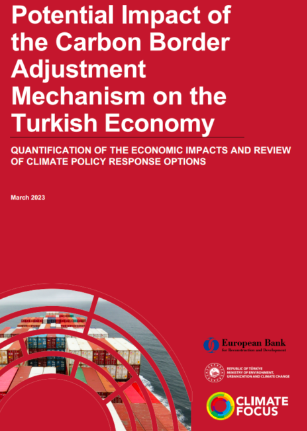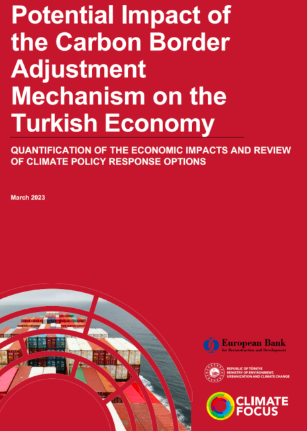
According to a report published by the Presidency of Climate Change of the Republic of Turkey, assumed Carbon Border Adjustment Mechanism (CBAM) certificate fees of 75 euros per ton of carbon dioxide equivalent (tCO2e) will result in an annual cost of 138 million euros for Turkey in 2027.
The Presidency of Climate Change of the Republic of Turkey announced the completion of its study titled “Potential Impacts of the Carbon Border Adjustment Mechanism on the Turkish Economy,” prepared in collaboration with the European Bank for Reconstruction and Development (EBRD).
The report addresses the effects of the Carbon Border Adjustment Mechanism (CBAM) on sectors included in its scope and the potential impacts of these effects on the Turkish economy. According to the report, the regulation is expected to expose Turkey, the sixth-largest trading partner of the European Union (EU), to rising costs, potentially affecting Turkey’s competitiveness and leading to short-term effects on GDP and employment.
The report indicates that if the CBAM certificate fees are set at 75 euros per tCO2e, Turkey’s annual cost could reach 138 million euros by 2027. However, if the certificate fees increase to 150 euros per tCO2e, the annual cost could rise to as much as 2.5 billion euros by 2032.
The sectors expected to be most affected by the regulation are projected to be, in order, the iron and steel, cement, and chemical products sectors. According to the study, with the CBAM certificate fee set at 75 euros per tCO2e, these three sectors together will account for 65% of the costs by 2032. If the fee is set at 150 euros per tCO2e, they will account for 70% of the costs.
Implementation of a National Emission Trading System (ETS) mitigates the economic impacts of CBAM
The report suggests that the implementation of a national ETS could reduce the impacts on sectors covered by BCAM and on the Turkish economy, and could effectively lower national greenhouse gas emissions in a cost-efficient manner.
The CBAM regulation allows for the deduction of the local carbon price from the CBAM fees, acknowledging existing carbon pricing policies in exporting countries. However, the report indicates that after the implementation of an ETS, if Turkey were to apply a local carbon price of 20 euros per tCO2e, potential CBAM costs could decrease to 56 million euros annually by 2027. By implementing a national ETS, Turkey could internalize these costs as ETS revenues, which could then be strategically utilized by the government to accelerate low-carbon development.
As CBAM imposes costs on importers in the EU based on emission levels, it will also impact the volume of exports from Turkey to the EU. According to the report, once the transition period is completed, the short-term effects of CBAM on exports are expected to be negligible. However, in a scenario where a national ETS is not implemented, a decrease of 2% and 3% in the flow of goods to the EU is projected by 2032 for CBAM certificate fees of 75 euros and 150 euros per tCO2e, respectively. Nonetheless, if Turkey were to adopt a national ETS, the growth of low-emission product exports would lead to a corresponding growth in overall exports.

